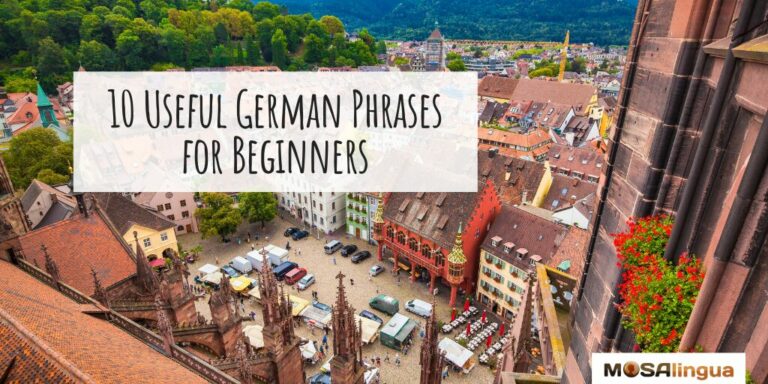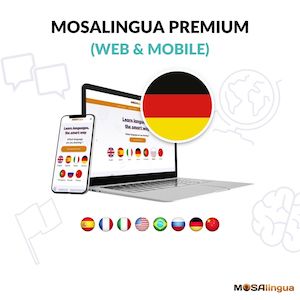Do you love German and want to learn the language, but don’t know where to start? Or maybe you’ve been picking up some German vocabulary, but don’t feel ready to take the plunge into speaking. Either way, here are 10 German phrases for beginners to add to your conversation arsenal. These are simple, everyday phrases that will help you in your everyday interactions with German speakers.

Learn German Phrases for Beginners: 10 Everyday Expressions
If you’re studying with MosaLingua, you already know that it’s a good idea to leverage your favorite subjects and activities to help you learn core vocabulary. Depending on what you like (travel, sports, a genre of music, etc.), you’ll choose your core vocabulary accordingly.
In addition to this basic vocabulary, there are also useful German phrases for everyday life that you’ll learn as you move through life and talk with people. When learning a language, one of our main aims is to make ourselves understood and to be able to talk to others. These expressions are therefore invaluable vocabulary for any learner. So let’s get started!
Hi, how are you?
Hallo, wie geht’s?
This is a friendly, informal greeting used when talking to a friend or colleague. It’s very friendly but not quite slang. If you’re looking for something a little more hip, try one of the following expressions:
- Was geht? (What’s up?)
- Wie läuft’s? (How’s it going?)
- Alles fit? (How are you doing?)
You can use “Hallo, wie geht’s?” with any person you speak to, whether it’s your manager at work or an elderly neighbor. Just make sure you use the polite version: “Hallo, wie geht es Ihnen?” (Generally speaking, this formal address is the equivalent of the French tu/vous or Spanish tú/usted.)
There are two ways to respond to the question “Hallo, wie geht’s?”
- “Gut, und dir?” (Good, and you?)
- or “Gut, und Ihnen?” (“Good, and you?”) to express yourself a bit more formally.
This phrase is first on our list for a reason, as it’s extremely common. Of course, it’s the beginning of just about every German conversation!
By the way…
Übrigens
This word is a great way to add information to a conversation or to introduce a new subject.
“Übrigens, ich habe dein letztes Video auf dem MosaLingua Kanal gesehen.”
(By the way, I saw your latest video on the MosaLingua channel.)
I’m delighted / flattered!
Freut mich!
You probably already know how to say “thank you” (danke / danke schön), but if you’d like to add a little variety to your speech, this is another good way to say that you’re grateful for their words or compliments.
I have to…
Ich muss…
It’s also important to know how to talk about your needs in German. The most common way to do this is to say “ich muss,” as in the example below:
“Ich muss noch einkaufen. Willst du mitkommen?”
(I have to go shopping. Would you like to come with me?)
You’ll use this expression just about every day, so it’s important to understand how to use it.
Sentences with this construction use the infinitive form of the verb. Have a look at the following examples:
- Ich muss aufräumen. (I have to clean up.)
- Ich muss arbeiten. (I have to work.)
- Ich muss etwas essen. (I have to eat something.)
- Ich muss mich ausruhen. (I have to rest.)
- Ich muss einen Kaffee trinken. (I have to drink a coffee.)
So as you can see, “Ich muss…” is used in all kinds of different contexts, and it’s almost always followed by an infinitive verb.
Excuse me!
Verzeihung!
Verzeihung is another polite expression that you’ll use on a very regular basis. It’s similar to “Entschuldigung” (sorry), and these words can be used interchangeably in some contexts.
You can use “Verzeihung” in several situations:
- to catch a server’s attention in a restaurant
- when someone is blocking your way, or you accidentally bump into someone
- if you didn’t hear what someone said, for example:
“Verzeihung, wie bitte?” (Excuse me, can you repeat that?)
Could I…
Könnte ich…
If you’d like to ask for something politely, use the phrase: “Könnte ich…” For example:
- Könnte ich bitte noch ein Stück von der Torte haben? (Could I have another piece of cake, please?)
- “Hallo! Könnte ich dich zurückrufen?” (Hello! Could I call you back?)
Would you like to…
Möchten Sie…
To ask someone nicely if they want something, you can say:
- Möchten Sie…? (Would you like…?) – formal
- or “Möchtest du gerne…?” (Would you like…?) – informal
For example: “Möchten Sie etwas Sahne zu Ihrem Stück Apfeltorte?“
(Would you like some cream with your slice of apple tart?)
How much is it?
Was macht das?
If you’re traveling in a German-speaking country, you’ll surely want to buy some souvenirs and taste some local specialties. Of course, you’ll need to know how to ask how much things cost!
German phrases for beginners: Ending a conversation politely
If you need to wrap up a conversation politely so you can get to another obligation, you can say:
“Ich sollte jetzt gehen.” (I have to go now.)
Or, if it’s really urgent, you can say:
“Danke für den schönen Nachmittag, aber ich muss jetzt los.”
(Thanks for the lovely afternoon, but I need to go.)
Saying goodbye
Before you leave, you should tell the other person that you hope to see them again soon. You probably already know “Auf Wiedersehen!” (Goodbye!) or “Tschüß” (bye), but you can also use “Bis später!” (See you later!) or “Bis zum nächsten Mal!” (See you next time!).
I hope you’ll incorporate these 10 common German phrases for beginners into your first conversations.
One last bit of advice: Start using them as early as possible so they become an automatic part of your German language foundation.
Bis zum nächsten Mal!
WATCH: Basic German Phrases for Beginners
You can also watch the video below to listen to the pronunciation of each of these phrases with our German instructor Magda. The video is in German, but subtitles are available in English and several other languages. Just click on the settings gear in the bottom right corner.
Don’t forget to subscribe to our YouTube channel
Go further
If you enjoyed this video article, you might also like:
Related posts:
Want to start improving your language skills today?
Start improving your German today
Good news: we can help!
More good news: you can get started for free! With your free trial, you can test drive the most effective method for learning German for the next 15 days!
Vocabulary flashcards, videos with subtitles, audiobooks, articles adapted to your level – with MosaLingua Premium (Web & Mobile), you’ll have access to all this and more. Get started right now. It’s free—and risk-free—to try!





Comments